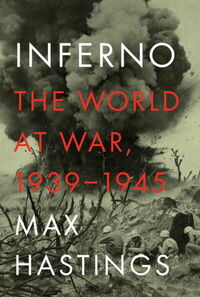Take a photo of a barcode or cover
What I liked most about this single volume history of WWII is that much of the focus was on the front-line soldier and sailor, and also on the impact of the conflict on the civilian population. The strategic movement of forces on land, sea and air, and the resultant battles were of course covered in the narrative, but served mostly to provide a context for the suffering that occurred by individuals and populations.
I also found it interesting that the book covered some battlefronts like Burma and Hungary that rarely get mentioned in a book like this that attempts to document the entire war.
I also found it interesting that the book covered some battlefronts like Burma and Hungary that rarely get mentioned in a book like this that attempts to document the entire war.
Hastings sets out to write a history of WW2 that captures the human experience--the terror and agony of war--and that gives coverage of the lesser theaters and stories of the war, such as the experiences of occupied France and Poland, the civil war in Yugoslavia, the Burma campaigns, etc. He accomplishes both tasks.
This book is huge, overwhelming, stuffed full of 658 pages of facts, and totally absorbing. It took me over a week to read it, but I'm glad I did. I am astonished at how much I did not know about WWII. I thought I was pretty widely read in the area for an American housewife. :-) But I discovered things constantly that I had NO IDEA about. 2 or 3 million Bengals starved to death in India because no one would send them food supplies to end a famine? Had NO idea. The war in northern Africa was more publicity-propaganda stunt than strategic advantage? Had not a clue. We really didn't need to invade Okinawa, the Philippines or Japan at all? Wow. And I knew that the Eastern Front was monumental in size to anything that happened in Western Europe. Really I did. I just had no idea of the magnitude, the scope of Russian suffering, the paltry insignificance of anything contributed by Americans. The author seems very middle-of-the-road politically, sometimes excoriating Roosevelt and Churchill for cynicism and manipulation but in all believing the "standard story" that the war had to be fought, the US had to be involved, and it's a good thing we did it. (He blew off with one dismissive sentence any idea that Roosevelt manipulated us into Pearl Harbor.) But in all I enjoyed this very much; I especially appreciated the quotes from real people of nearly every place and part of the war telling about their experiences. If someone wants an overview of the entire huge war, this would seem to me to be a pretty good place to start.
As a product of the US education system and a college History major, let me tell you that I learned SO MUCH important information in this book about WWII that was never mentioned in any of my classes! If you're curious about WWII, geopolitics, or just what your grandfather went through in "the War", read (or listen) to this book.
A very engaging history of the war, told from the perspective of the people (both soldiers and civilians) who lived through it. I have a hard time reading military books - too much talk about strategy leaves me cold, as I'm interested in the human history of things. This is the best book on WWII that I have read from that perspective. It's well laid out, both by geography and year. I read it very quickly for such a subject!
This book is extremely informative! Most WWII books focus solely on Germany, Britain, the US, and occasionally France. It gave me a whole new insight into Russia's involvement. I just kept thinking if Germany and Russia remained allies, what a different war it would have been. It also covered countries such as Yugoslavia that I had no idea were involved in a war during that time.
Hastings had a way of removing the romanticism that I often find in WWII literature. It was a nasty, brutal war that consisted all the horrors found in conflicts. It was especially interesting to find out that the US news was censored from writing about anything that negatively portrayed their soldiers. It helps explain why Vietnam came as such a shock to the American public.
My only complaint was that the book moved at such a fast pace that I found myself having to go back a lot. If you do decide to read it, make sure to take your time.
Hastings had a way of removing the romanticism that I often find in WWII literature. It was a nasty, brutal war that consisted all the horrors found in conflicts. It was especially interesting to find out that the US news was censored from writing about anything that negatively portrayed their soldiers. It helps explain why Vietnam came as such a shock to the American public.
My only complaint was that the book moved at such a fast pace that I found myself having to go back a lot. If you do decide to read it, make sure to take your time.
challenging
dark
emotional
informative
sad
medium-paced
emotional
informative
sad
medium-paced
adventurous
emotional
informative
reflective
medium-paced
dark
informative
tense
slow-paced



